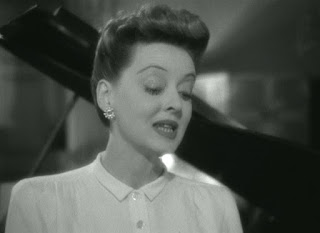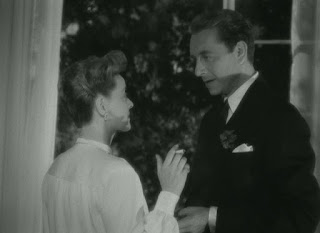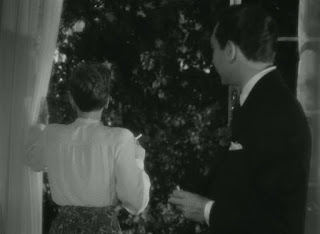The Story: Now, Voyager. Wow.
I can't believe I've waited so long to see this movie, which is right "up there" with the best of the Warner Brothers Studio. And of cinema itself.
Think of indelible movie images: Rick and Ilsa at the airport. Cagney scheming in the rain. Kelly singing in the rain. A burning sled. Slim Pickens riding a bomb like a bronco.
And Bette Davis and Paul Heinreid sharing cigarettes at an open window.
And most "classic" compilation shows only present the part from the cigarette-lighting to the immortal last line and the pull-up to the night-sky (probably concocted in the editorial department by future-director Don Siegel). They don't show what's gone before it, leading to this finale. And it is far more interesting.
Bear in mind, that the movie was made and released in 1942 and strictures on subject matter by the Hayes Code—designed to eliminate morally questionable content—were in full force. There couldn't be any adultery shown, certainly there couldn't be the hint of an affair between Bette Davis' Charlotte Vale and Paul Henreid's* Jeremiah Durrance...merely the long-suffering mutual love that can never be realized, at least while Mrs. Durrance is still in the picture.
One also has to consider the dictates of the genre that Now, Voyager inhabits...the so-called "women's picture." Charlotte Vale is a woman who is forthright, tasteful, dresses well, and is charitable, forgives slights, and manages to achieve an independence and autonomy that most women—in darker, more turgid scenarios, would kill for. In modern terms, she has "agency." She also has the benefit—to fulfill the genre—of being loved, but not having to act on it.
Sounds like a really good deal.
But, bear in mind, that she rejects one wealthy, handsome, societally-approved "catch" and is loved by a man that she cannot have. And she's good with that. And her monster of a mother no longer has any control over her. She can do what she wants. And for her, it's to take care of the troubled child of the man she cannot have, an act rooted in her own struggles for independence and self-actualization, free of judgment and the preoccupation of others.
So, here's this scene with the child's father, her forbidden love...and...he just doesn't get it. He sees everything through a male lens of pride and shame and thinks that whatever she does has something to do with him. The ego of the man. She rejected her previous fiancé for far less—a mere incompatibility—than this guy's neurosis.
It puts into a more clear perspective that final line of "let's not ask for the moon. We have the stars." She's saying "I've got what I want, what you want is asking too much."
It puts me in mind of a line that one of the story-tellers said on The Moth Radio Hour the other day that was a corker:
"You have to be a damned good husband to be better than no husband at all."
Gayliene Omary
And Jerry, with his selfish petulance, his lack of understanding, his aggressive carnality...just doesn't cut it.
Good for Charlotte. She gets a happy, not a melancholy, ending.
Now, before we get to the scene, one important notice (that might be required).
The Set-Up: (from Premiere Magazine, February 2000): "In 1942, at the height of her stardom, Bette Davis took on one of Hollywood's great ugly-duckling roles...She even gained some weight to play Bostoniann Charlotte Vale, a dumpy, emotionally fragile young woman who struggles to free herself from the clutches of her cruel dowager mother (Gladys Cooper). With the help of a caring psychiatrist (Claude Rains), she finds her self-respect, but only truly blossoms after a brief romance with Jerry Durrance (Paul Henreid), a married man. Although Jerry's marriage is loveless, he remains devoted to his children and ailing wife. The two lovers part ways, but Charlotte, her feelings for Jerry undiminished, eventually breaks off an engagement to a wealthy suitor. A relapse sends her back to Jaquith's sanitarium, where she meets and befriends Jerry's daughter Tina (Janis Wilson). Seeing a way to be useful and to somehow be closer to Jerry, Charlotte takes Tina with her to her Boston mansion—with Jaquith's conditional approval. Some time later, Jaquith and Jerry are invited to dinner, and after seeing Charlotte again, Jerry wanders into the library to gather his thoughts. Charlotte walks in..."
Action.
Charlotte: Surely he's told you we have to wait
until she's fit...
...before we can treat her
like a normal girl.
Jerry: I don't care what he says.
No self-respecting man would allow your
self-sacrifice to go on indefinitely.
Charlotte: Why, Jerry, that's the most conventional,
pretentious, pious speech...I've ever heard in my life.
Charlotte: Let me explain. You will be giving. Don't you know that to take is sometimes a way to give -
Charlotte: the most beautiful way in the world if two people love each other. You'll be giving me Tina, every single day I'll be taking and you'll be giving.
Jerry: Happy? She confessed to me upstairs she thought she loved you almost as much as she loves me.
Jerry: Because I came along and ruined him for you, and now my child comes along and claims all your attention and takes your whole life Jerry: when you should be trying to find some man who'll make you happy.
Charlotte: Apparently, you haven't the slightest conception of what torture it is to love a man and to be shut out, barred out,
Jerry: Charlotte, let me -
Charlotte: would make her seem actually like our child after a while. Charlotte: But I see no such fantasy has occurred to you.
(She walks away from him)
Jerry: I was afraid you were keeping Tina out of pity. But there was no note of pity in your ridicule of me just now.
Jerry: Now I know you still love me, and it won't die, what's between us. Do what we will - ignore it, neglect it, starve it -
(He releases her and walks to the open window.
Charlotte: Jerry,
Charlotte: Dr. Jaquith knows about us. When he said I could take Tina, he said, "You're on probation."
Charlotte: He allowed this visit as a test, and if I can't stand such tests, I'll lose Tina, and we'll lose each other.
Charlotte: and just think, it won't be for this time only. That is, if you will help me keep what we have,
Words by Casey Robinson
Pictures by Sol Polito and Irving Rapper
Now, Voyager is available on DVD and Blu-Ray from Warner Home Video and The Criterion Collection.
* Full name Paul Georg Julius von Hernreid, he'd fled Austria after being labeled "an enemy of the Third Reich" in Germany, and was working in England and nearly deported as an "enemy alien" when World War II broke out, only to be saved by actor Conrad Veidt—the two would later work together in Casablanca. Now, Voyager was Henreid's first film was Warner Brothers.
























































































































No comments:
Post a Comment